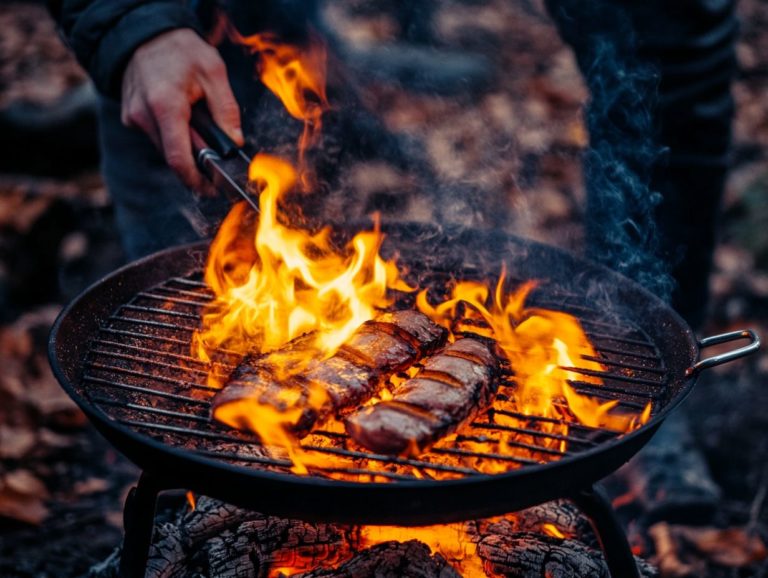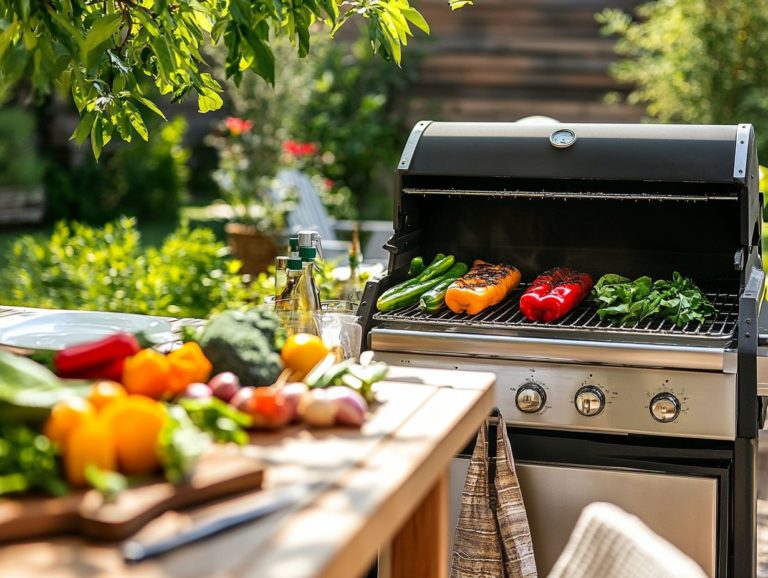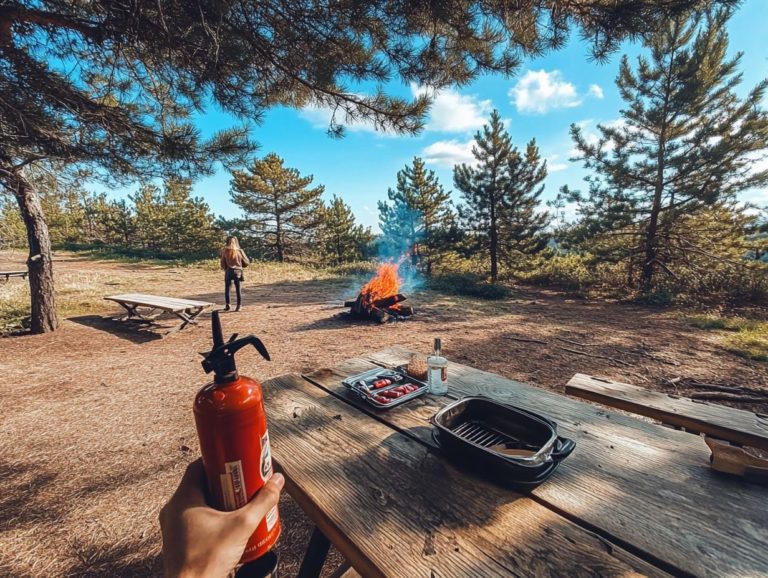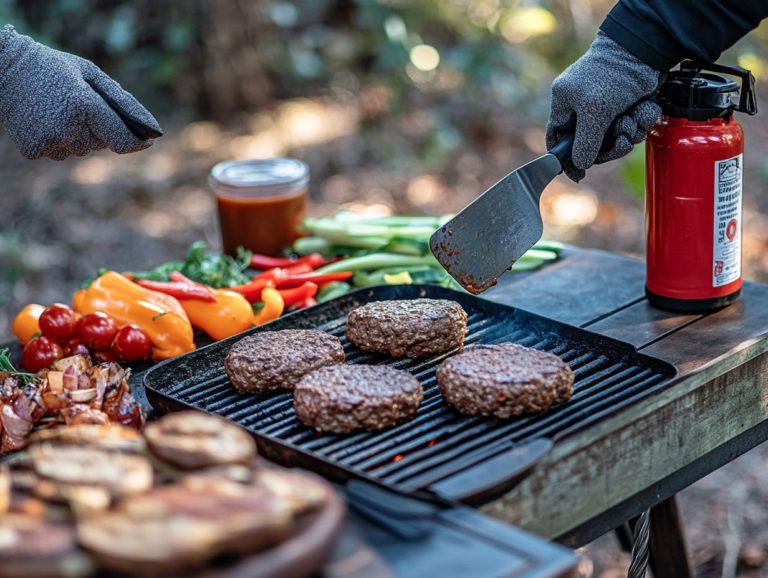How to Safely Use Cast Iron Cookware Outdoors
Cast iron cookware is a cherished companion for outdoor cooking enthusiasts. It provides a unique combination of durability and versatility that few materials can rival. Whether you grill beneath a starlit sky or simmer a hearty stew by the campfire, the advantages of using cast iron are remarkable, especially considering its affordability and easy cleaning methods.
Get ready to equip yourself with the essentials for preparing and seasoning your cast iron. This guide also includes crucial safety tips to ensure a smooth cooking experience, along with effective cleaning tips for outdoor use. You’ll discover best practices for cleaning and maintaining your prized cookware, ensuring a clean kitchen environment even when you’re cooking outdoors.
Enjoy a selection of delicious recipes tailored for outdoor cooking that will inspire your culinary adventures. Elevate your outdoor cooking game today!
Contents
- Key Takeaways:
- Benefits of Cast Iron Cookware for Outdoor Use
- Preparing and Seasoning Your Cast Iron Cookware
- Safety Tips for Using Cast Iron Cookware Outdoors
- Cleaning and Maintaining Your Cast Iron Cookware
- Exciting Outdoor Cast Iron Recipes!
- Frequently Asked Questions
- Can I use cast iron cookware outdoors?
- What are the benefits of using cast iron cookware outdoors?
- How do I properly season my cast iron cookware for outdoor use?
- Can I clean my cast iron cookware with soap?
- Can I use metal utensils on my cast iron cookware for outdoor cooking, especially with brands like Staub and Le Creuset?
- How do I store my cast iron cookware to prevent rusting?
Key Takeaways:
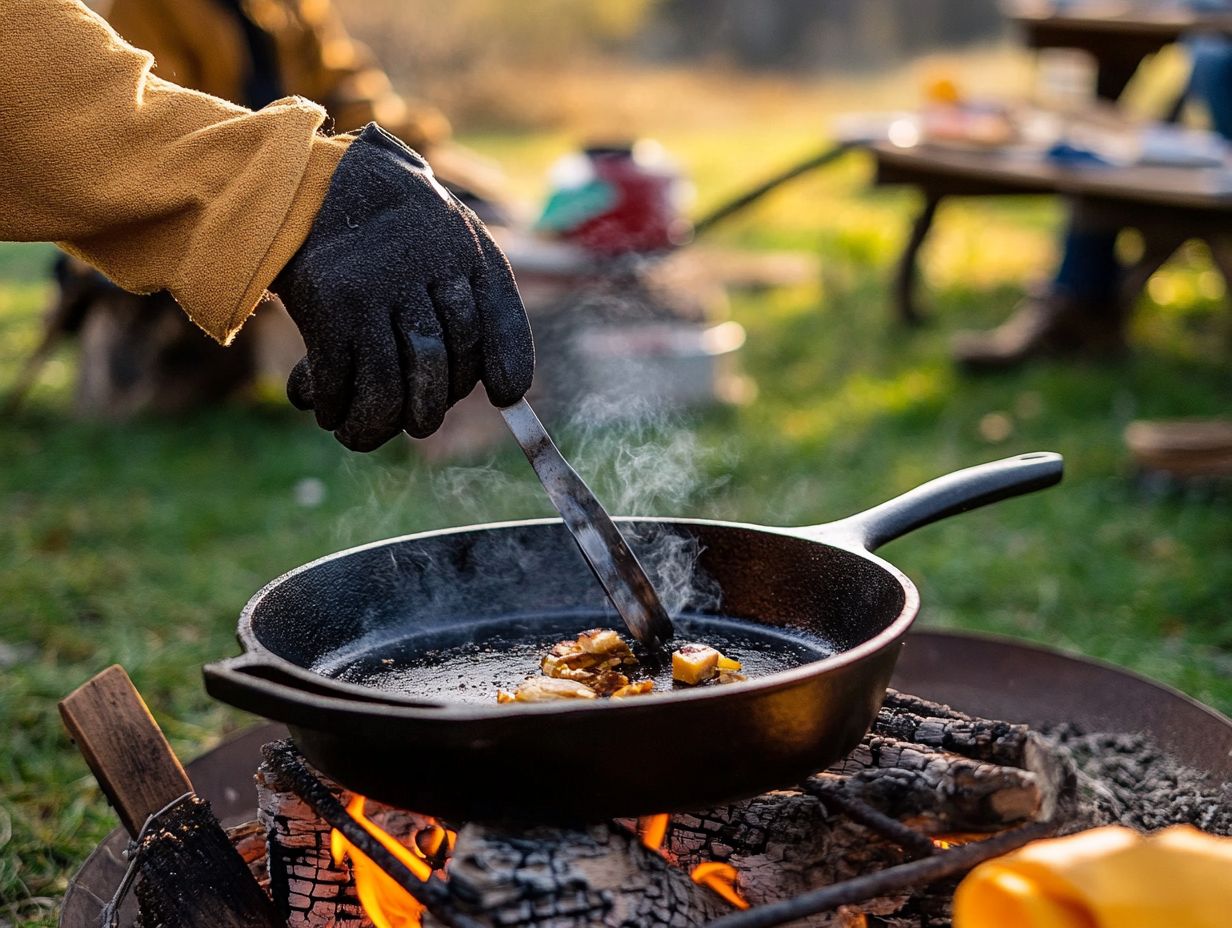
- Cast iron cookware is both durable and versatile, making it perfect for outdoor cooking.
- Properly preparing and seasoning your cast iron cookware is essential for optimal cooking and preventing rust.
- Following safety tips and best practices for cleaning and maintaining your cast iron cookware ensures safe and enjoyable outdoor cooking experiences.
Benefits of Cast Iron Cookware for Outdoor Use
Cast iron cookware stands out as a premier choice for outdoor cooking, bringing a wealth of advantages particularly suited for camping adventures, especially regarding preparation and cleaning. Its remarkable durability allows it to handle the challenges of campfire cooking with ease, while its versatility enables you to master various cooking techniques from baking cornbread to searing meats. To enhance your outdoor cooking experience, it’s also important to learn how to safely use a grill in your backyard, making it ideal for all types of camping cookware.
Additionally, the exceptional heat retention makes it a beloved option for both home cooks and camping enthusiasts, guaranteeing that your meals are cooked to perfection during your next outdoor escapade.
Durability and Versatility
The durability of cast iron cookware is truly unparalleled, establishing it as a must-have for your camping and outdoor cooking adventures. This heavy-duty material is designed to withstand extreme temperatures, whether you’re gathered around a roaring campfire or using a traditional camp stove. However, it’s crucial to follow safety tips for cooking with open flames outdoors to ensure a safe experience.
Imagine a well-seasoned cast iron skillet that transitions seamlessly from the flames of a barbecue to the heat of an open flame. It enables you to sear, saut , or bake with absolute confidence, ensuring even heating every time. Its remarkable ability to retain heat ensures that your meals cook evenly, making it possible to whip up everything from hearty stews to crispy cornbread in even the most rugged environments.
No matter how you choose to cook, its versatility makes it a beloved choice for outdoor enthusiasts eager to craft delicious meals without sacrificing quality.
Preparing and Seasoning Your Cast Iron Cookware
Preparing and seasoning your cast iron cookware is essential for both longevity and peak performance, particularly when you’re cooking outdoors. A well-seasoned pan not only offers a naturally non-stick surface but also elevates your culinary experience, allowing you to whip up everything from fluffy scrambled eggs to delectable baked cornbread.
While opting for skillets that come already treated for easy cooking can make things easier, investing time in regular maintenance with a cast iron brush and employing quality seasoning techniques will significantly enhance your cookware’s efficiency on your next adventure.
Steps for Properly Preparing and Seasoning
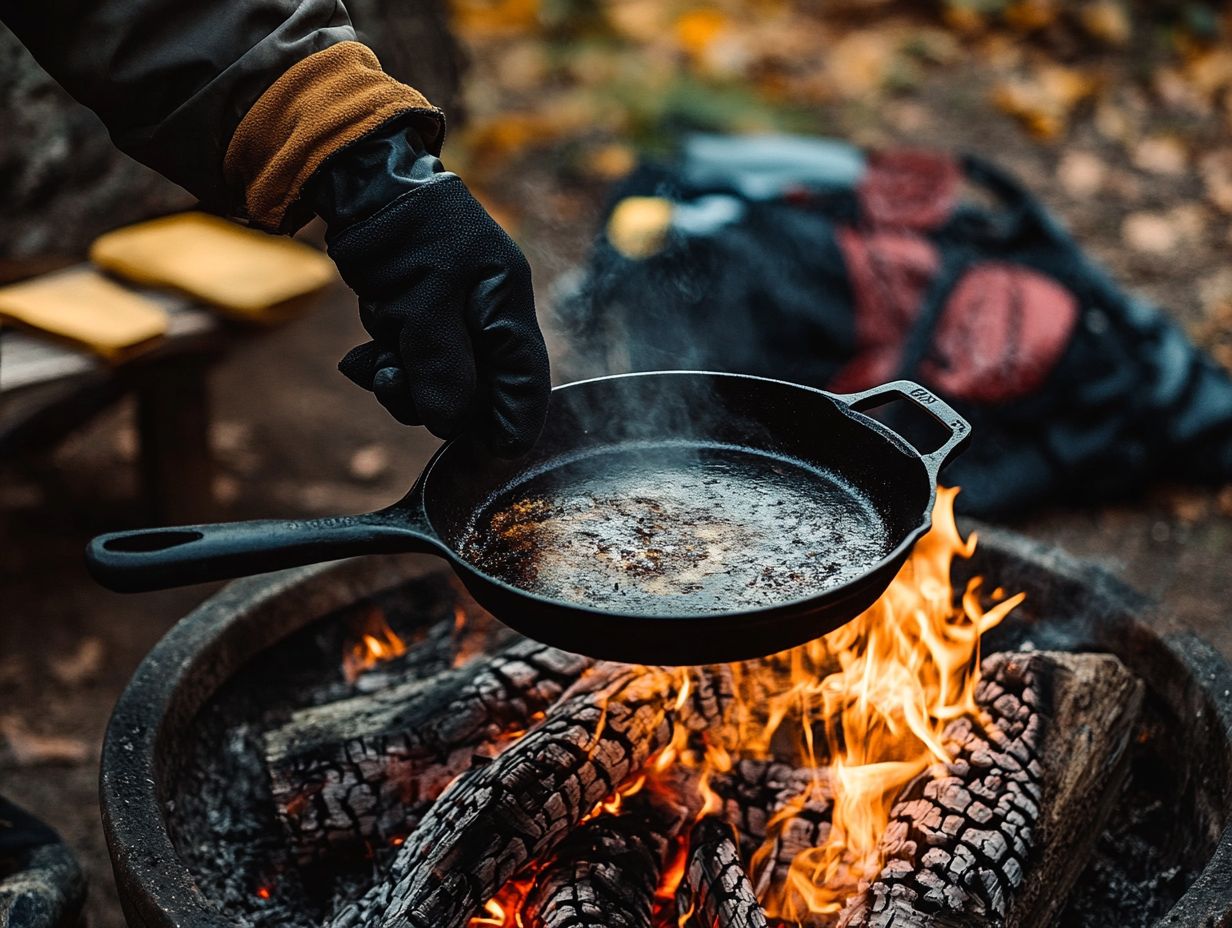
Properly preparing and seasoning your cast iron cookware involves essential steps that ensure its effectiveness and longevity. Quality seasoning techniques and regular cleaning are key to maintaining your cast iron after each use.
- Start by thoroughly cleaning your skillet or pan with warm water and mild dish soap to remove old food residue.
- If you encounter stubborn particles, whip up an abrasive salt paste using coarse salt and a touch of vegetable oil. Gently scrub with a cloth or sponge, taking care not to scratch the surface.
- Once it’s clean, dry the cookware completely to prevent rusting. Apply a thin layer of oil, such as flaxseed or canola, to create that all-important protective seasoning layer.
Regular use of your cast iron, along with light oiling after each cleaning, will enhance its non-stick properties and deepen its flavor and character over time. This makes it a staple for home kitchens and perfect for your next camping trip.
Safety Tips for Using Cast Iron Cookware Outdoors
When using cast iron cookware outdoors, prioritizing safety is vital to preventing accidents and ensuring an enjoyable cooking experience. Use heavy-duty tongs for handling hot cookware. Additionally, learning how to use a Dutch oven for outdoor cooking is essential, especially over an open flame or camp stove.
Taking proactive measures to prevent rust like thoroughly drying and correctly storing your cookware will help preserve its performance and appearance. This allows you to focus on creating delicious meals during your camping adventures.
Preventing Rust and Other Hazards
Preventing rust and other hazards is crucial for maintaining the quality of your cast iron cookware, especially during outdoor adventures. Using stainless steel scrubbers can help manage food particles effectively.
To keep your cast iron in peak condition, establish a routine of thoroughly cleaning and drying it after each use. Moisture is the enemy, so never leave your cast iron soaking in water; that s a surefire way to invite rust.
After washing, dry the cookware immediately with a towel and place it on low heat to evaporate any lingering moisture. Maintaining the seasoning is equally important; applying a light coat of vegetable oil reinforces the protective layer.
Proper storage is also key. Keep your cast iron in a dry place, ideally with a paper towel to absorb any excess moisture, ensuring it stays in optimal shape for your next culinary adventure.
Cleaning and Maintaining Your Cast Iron Cookware
Cleaning and maintaining your cast iron cookware is essential for its longevity and performance, especially in outdoor settings. Additionally, when cooking outdoors, it’s important to know how to safely use a fire pit for cooking. By adopting best practices in cleaning and utilizing quality seasoning techniques, you ensure your cookware stays in impeccable condition after every use, fostering a pristine kitchen environment, whether at home or while camping.
Employing techniques such as stainless steel scrubbers, cast iron brushes, and abrasive salt pastes allows you to effectively remove food particles without jeopardizing the seasoning. Don t wait acting quickly will keep your cookware in top shape!
Best Practices for Cleaning and Storing
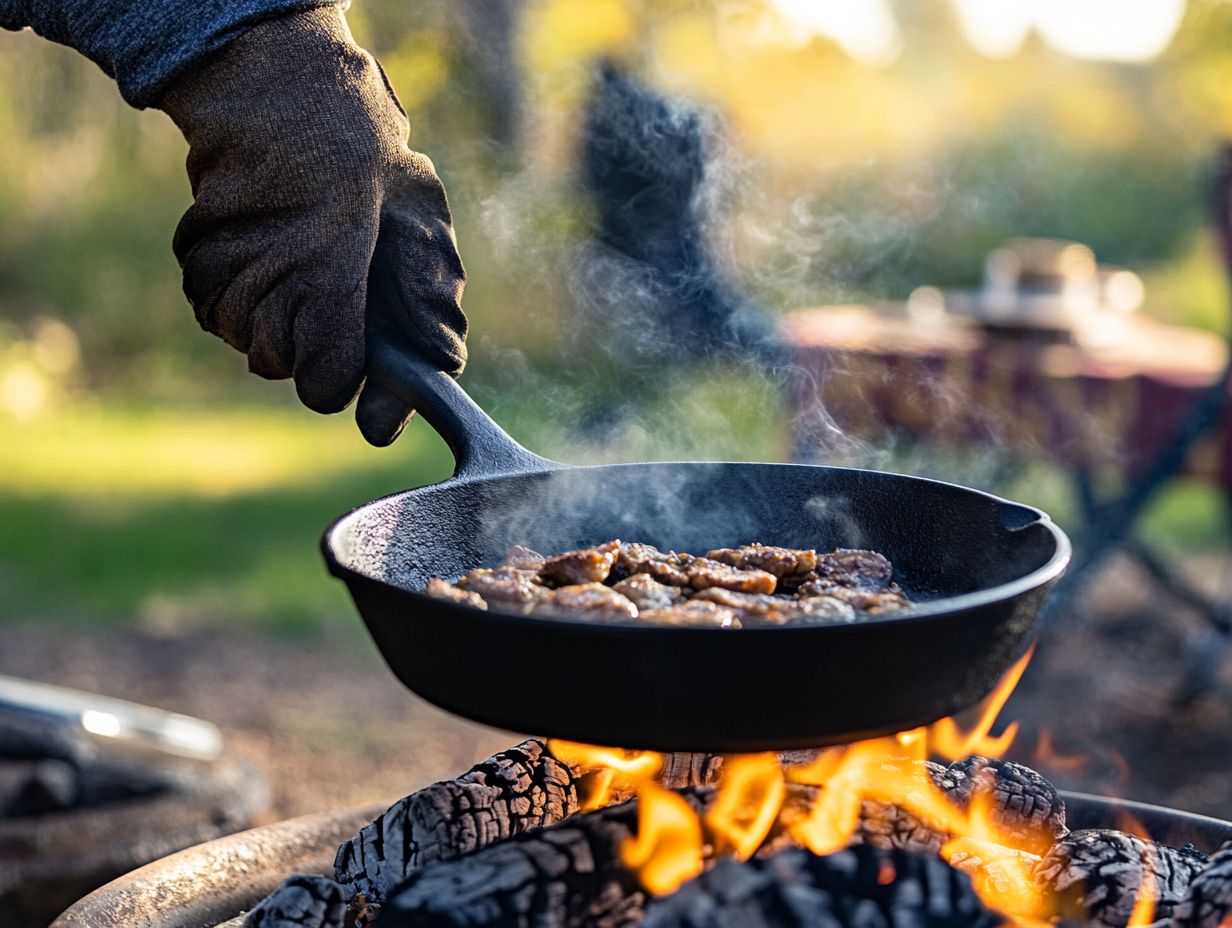
Adhering to best practices for cleaning and storing your cast iron cookware is vital for ensuring its longevity and best results, especially when using travel cookware for outdoor adventures. It’s also important to consider if outdoor cooking is safe to ensure a worry-free experience.
By familiarizing yourself with the necessary tools and techniques, you can easily maintain the seasoning a protective layer that enhances the cookware’s performance and functionality of this cherished kitchen essential, ensuring it stays budget-friendly for all your camping adventures.
Utilizing materials such as a chainmail scrubber or a gentle brush allows you to effectively remove food particles without harming the surface, making cleanup a breeze. It’s crucial to steer clear of soap, as it can strip away the precious seasoning, a key aspect of cast iron care.
Thoroughly drying your cookware after washing is critical to prevent rust. Using dry heat on the stove is an excellent way to eliminate any lingering moisture.
Proper storage, such as placing a paper towel between stacked pans, helps control moisture and preserves the seasoning, ensuring your cast iron remains a reliable cooking companion for years to come.
Exciting Outdoor Cast Iron Recipes!
Exploring recipes and ideas for outdoor cast iron cooking can truly elevate your camping experience, transforming meal preparation into an enjoyable and memorable part of your adventure. To ensure a safe experience, consider following these safety tips for cooking on a budget outdoors with easy recipes that suit all tastes.
With the incredible versatility of cast iron skillets, you can effortlessly create everything from classic cornbread to hearty one-pan meals over a crackling campfire, making it a go-to for all your camp cooking essentials.
By embracing simple yet delightful recipes that leverage the unique qualities of cast iron, you ll turn your outdoor excursions into a culinary journey that will impress everyone on your next backpacking trip!
Delicious and Easy Meals to Try
In terms of preparing delicious and effortless meals in cast iron cookware while camping, you ll discover a world of diverse and satisfying options.
From hearty breakfast skillets to savory one-pan dinners, cooking with cast iron offers unparalleled versatility and flavor, no matter your surroundings. Picture yourself starting the day with a simple frittata, brimming with fresh veggies and a touch of cheese.
Or perhaps a classic breakfast hash loaded with crispy potatoes and smoky sausage, making it a perfect example of easy meals to try while camping.
As the sun sets, you might choose to craft a comforting chili or a vibrant stir-fry, all within the dependable embrace of your trusty skillet, ensuring your meal is both delicious and budget-friendly.
The allure of cast iron lies not just in its impressive heat retention and weight retention, but in its remarkable ability to transform simple ingredients into warm, mouth-watering meals, perfect for savoring around the campfire.
Frequently Asked Questions
Can I use cast iron cookware outdoors?
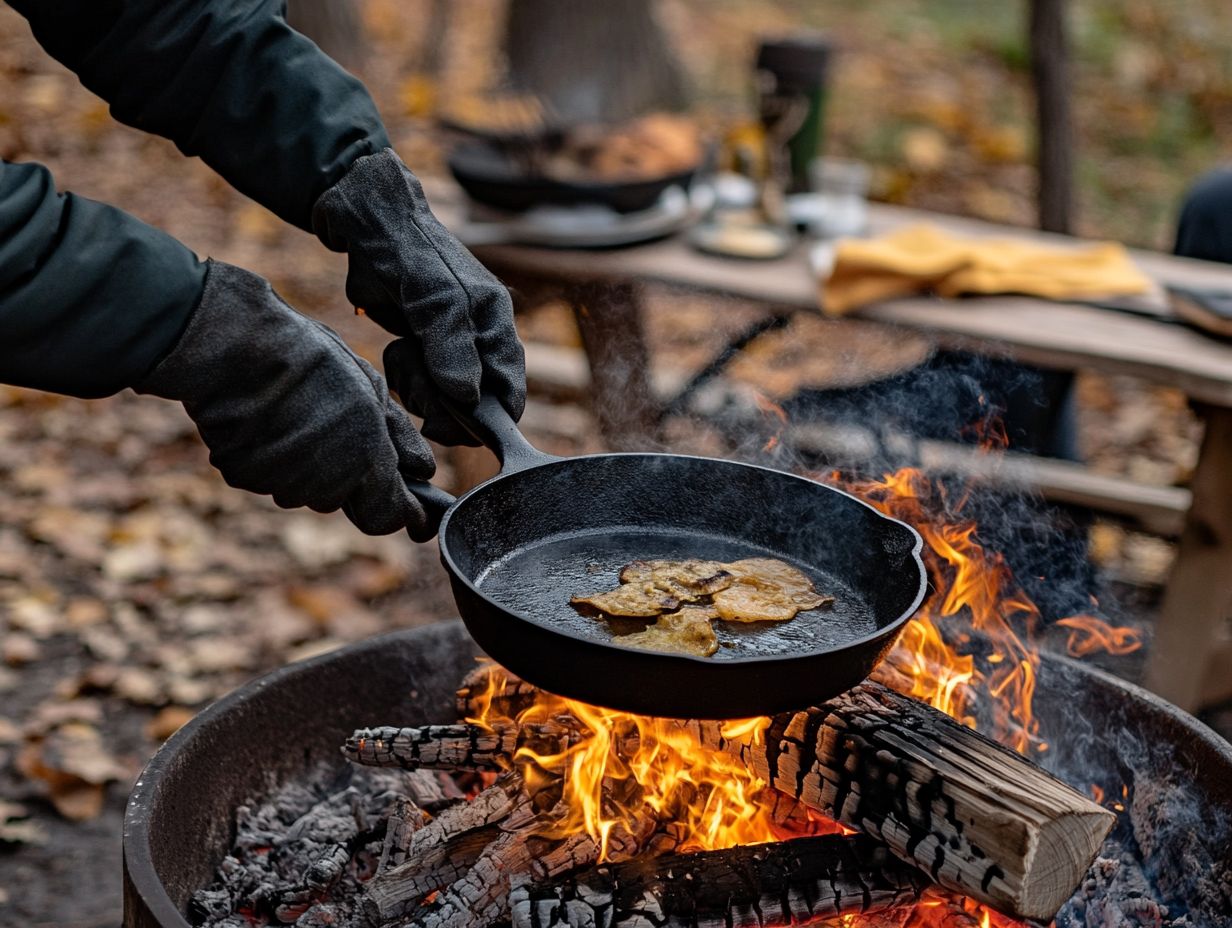
Yes, you can safely use cast iron cookware outdoors. In fact, it is a popular choice for cooking over an open flame or on a camping stove. To learn more about its benefits, check out this guide on how to use cast iron for fire pit cooking, making it a favorite among home cooks and outdoor enthusiasts alike.
What are the benefits of using cast iron cookware outdoors?
Cast iron cookware is durable, versatile, and can withstand high heat. These features make it perfect for outdoor cooking. When cooking with little chefs, it’s important to keep safety in mind, so check out these tips for cooking with kids outdoors safely. It also adds a unique flavor to food and can be used on various heat sources.
How do I properly season my cast iron cookware for outdoor use?
To season your cast iron cookware, coat it with a thin layer of oil and place it on a grill or in a hot oven for about an hour. Repeat this process a few times to create a non-stick surface and protect the cookware from rust.
Can I clean my cast iron cookware with soap?
No, it is not recommended to clean cast iron cookware with soap as it can strip away the seasoning. Instead, use hot water and a scrub brush to remove any food residue. Dry it thoroughly and apply a thin layer of oil before storing.
Can I use metal utensils on my cast iron cookware for outdoor cooking, especially with brands like Staub and Le Creuset?
Yes, you can use metal utensils on cast iron cookware. It’s strong enough to handle them without scratching.
How do I store my cast iron cookware to prevent rusting?
Want to keep your cast iron in tip-top shape? Just follow these simple steps!
Keep your cast iron cookware in a dry spot to keep rust at bay! Place a paper towel inside to soak up moisture. Avoid stacking them to protect the seasoning.

